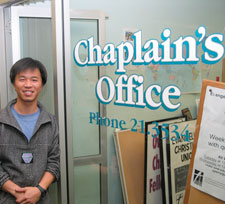 The leader of Australia's evangelical student organisation has taken on a strategic international role.
The leader of Australia's evangelical student organisation has taken on a strategic international role.
Australian Fellowship of Evangelical Students’ (AFES) national director Richard Chin has been made the International Fellowship of Evangelical Students’ (IFES) regional secretary for the South Pacific.
This position gives him a leadership role in a region that includes Australia, New Zealand, Fiji and Papua New Guinea.
"We want to see student work progress as staff workers partner with students, especially in the Pacific Islands," he says.
To improve the work in the region, Mr Chin says the Australian National Training Event (NTE) in 2008 will be a training event for all the South Pacific nations.
"Next year's NTE will be a one-off training event for the whole South Pacific region. It will be like NTE with hormones!" Mr Chin exclaims.
"We are really keen to get more South Pacific representation, especially from smaller nations like Tonga, Vanuatu and the Solomons."
The main speaker at next year's NTE will be New Zealand Tertiary Students’ Christian Fellowship general secretary Nigel Pollock.
Mr Chin's appointment comes in a year when the IFES has also appointed a new General Secretary.
Dr Daniel Bourdanne, who was previously the regional secretary of French-speaking Africa took on the post this year, taking over from Welshman Lindsay Brown who had been general secretary since 1991.
NTE brings 1000 together
The 10th AFES National Training Event (NTE) is on from 1st to 5th December this year at the Australian National University in Canberra and will be attended by more than 1100 students from universities nationwide.
Ridley College principal Dr Peter Adam and University of Newcastle senior staff worker Greg Lee will speak at the conference on the theme God’s Word to God’s World.
Following NTE, the students will travel to around 60 different churches nationwide to assist in short-term missions.
AFES National Administrator Howard Spencer says the short-term missions are an important follow-up to the training event.
"You go to a conference and get trained and encouraged for evangelism and before you get cold feet the mission allows you to practice and apply what you've learnt straight away," he says.
Mr Spencer says the missions are beneficial to both students and those in the local churches.
"Students who mightn't know each other on campus get to know each other through doing ministry together," he says.
"The student missions are also a catalyst for the churches to do local outreach. They provide momentum and people-power for evangelistic events the churches are running."






















